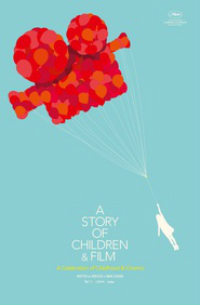Youth In Revolt (and More): Cousins Channels Marker
 It should be no question that Mark Cousins’ vast knowledge of film history is integral to his own filmmaking process, with his previously lauded endeavor, the epic 15 hour personal tour of cinematic lineage in The Story of Film: An Odyssey posing as a definitive screen history of uncomparable expansiveness. But his employment of film history is not just an implementation of influence. Rather, it is the subject he can not seem to tear himself from. This time around his focus falls on the cinematic depiction of youth in cinema, why they have become unfathomably integral to so many great works of art and how they continue to have our attention on the big screen. Like its predecessor, A Story of Children and Film takes us around the globe and through time to highlight cinematic greatness with the same brilliantly insightful wit, but this time Cousins looks for qualities sui generis to adolescence.
It should be no question that Mark Cousins’ vast knowledge of film history is integral to his own filmmaking process, with his previously lauded endeavor, the epic 15 hour personal tour of cinematic lineage in The Story of Film: An Odyssey posing as a definitive screen history of uncomparable expansiveness. But his employment of film history is not just an implementation of influence. Rather, it is the subject he can not seem to tear himself from. This time around his focus falls on the cinematic depiction of youth in cinema, why they have become unfathomably integral to so many great works of art and how they continue to have our attention on the big screen. Like its predecessor, A Story of Children and Film takes us around the globe and through time to highlight cinematic greatness with the same brilliantly insightful wit, but this time Cousins looks for qualities sui generis to adolescence.
Where the director’s influences show are in his chosen form. Untethered from the chronology of history, Cousins moves freely through time and space, referencing the likes of Wes Anderson to Yasujiro Ozu in a matter of moments based on the actions of his own niece and nephew on a brief piece of unplanned home video. The film feels very much like the unfettered video essays of the late Chris Marker, but with Cousins’ reserved Irish inflection leading us along.
Marker’s admirational dissection of Andrei Tarkovski’s oeuvre in One Day in the Life of Andrei Arsenevich specifically comes to mind, sifting through films and themes via free associative edits. Cousins employs the same technique, finding visual elements between films to explicate or contrast meaning. In some cases one might be able to guess the path of natural progression, as when the filmmaker moves from a scene in which a child from Boudewijn Koole’s Kauwboy poses as an adult to care for a downed baby bird to Ken Loach’s eponymous Kes, in which the continually teased kid, Billy, sheds his shyness when speaking of training his pet falcon. Cousins, reminds that both films show a kind of inferred adulthood, growing up through youthful empathy.
Balloons, an easy but anagramic symbol of childhood, appear and reappear throughout the film. From Albert Lamorisse’s classic French short, The Red Balloon, to J. Lee Thompson’s unvalued British feature, The Yellow Balloon, to Jafar Panahi’s fiction debut, The White Balloon, to Kira Muratova’s Ukrainian tragedy, Melody for a Street Organ, Cousins deconstructs both the synthesis of their inclusion and their regional inflection in simple, yet sophisticated terms (one example is a craned camera movement that calls to mind Singin’ In The Rain, but negates the exuberance of Gene Kelly’s moment into dour melancholy). Yet, the films he returns to the most, E.T., Night of the Hunter and Moving contain a wide range of children’s traits, from wonder to rebellion to parental disconnection, sometimes all within a single scene. Here the filmmaker reminds that children live for the moment, and film itself is a medium of moments strewn together in motion before youth denigrates with age.
A portion of A Story of Children and Film sees the director venture into the misty wild to reflect with camera in hand, though never actually appearing before it. His lens finds horned beasts – ‘is that a dog or cat?’ (a playful Marker reference?) – and glorious landscapes in various states of rain or shine. Cousins is a travelling man, as well as a part time writer, so it makes sense that his film related adventures be the subject of his insightful monthly Sight & Sound column, Dispatches. Never before has his cinema so much resembled his written work. His vocational travels, written travails and cinematic inspiration seem to have coalesce in perfect harmony, forging a collage of intimately perceived and elegantly processed images that burn with a fire unique to the malleable and genuine age of youth.
Reviewed on September 5th at the 2013 Toronto International Film Festival – TIFF Docs Programme. 101 Min.


